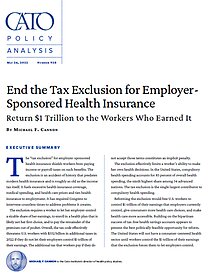For longer than modern health insurance has existed—and nearly as long as there has been a federal income tax—the federal tax code has treated employee health benefits differently from cash compensation. Cash compensation is subject to income and payroll taxes. When employers instead pay workers with health insurance, that compensation avoids both types of tax.
Economists have argued for decades that Congress should limit or eliminate the tax exclusion for employer-sponsored health insurance. They argue that the exclusion distorts labor and health care markets, such as by increasing medical prices and health insurance premiums. Some say the exclusion is the single most harmful federal intervention in health care. Others say it is simply a tax cut that benefits workers by making health care coverage more accessible.
Please join our panel of experts to explore the impact of the tax exclusion and whether Congress should reform or end it.
Lunch will be served at 12:30 PM.






